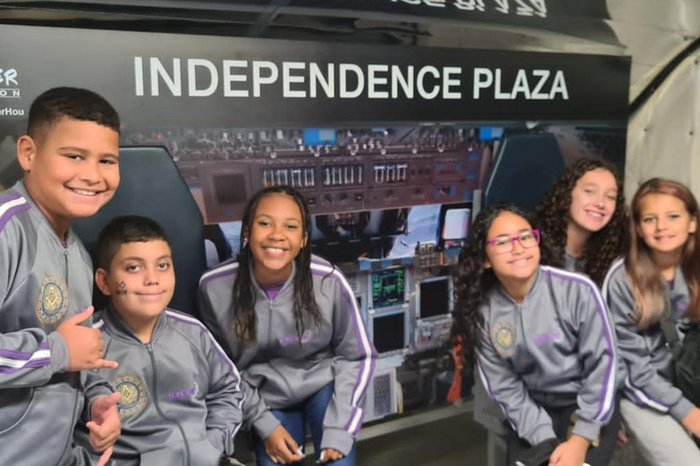Christian Cabral / personal archive
Pedro Begas/PMPA/Disclosure
Pedro Begas/PMPA/Disclosure
Andre Avila/RBS
Andre Avila/RBS
Andre Avila/RBS
Andre Avila/RBS
It is located in the center of Vila Mapa, in a low-income family neighborhood Porto Alegre, which left one of two Brazilian schools and the only public one to participate in the 2023 edition of the First Lego League World Festival (FLL). And this is not an isolated case – it is named after one of Brazil’s greatest composers, the Escola Municipal de Ensino Fundamental (Emef) Heitor Villa Lobos, in Lumpa de Pinheiro, is dedicated to creations not only in music but also in the field of robotics. In this field, since 2007, there are more than 40 medals and 30 trophies in national and international competitions.
The latest adventure Lobotics, as your high school robotics team is called, which ended a week ago, when they returned to Porto Alegre, directly from the United States. There, six students and a teacher Cristian Cabral won the “Best Solution Model” category with a robotic model that designs a leisure and entertainment space for the Vila Mapa community, with games powered by renewable energy, a theme proposed in this edition of FLL.
– the children decided to look at society itself. Like all parties, there are many power problems, such as lack of light, and wire theft. We’ve already been involved in recreational projects for the community, so the students found it interesting to think of building a square with energy in mind,” says the teacher.
The students miss the squares at Vila Mapa and, therefore, decided to design a revived one. Using robots, they create an amusement park, with solar, wind and dynamo powered rides, which operate through the use of a spinning wheel. The result was a model made of Lego pieces, which was taken to be presented at FLL Explore, aimed at children from six to ten years old. There are also specific competition sections for children aged 4 to 6 and for older children aged 9 to 16.
The mother of projects using bots at Heitor Villa Lobos is Professor Christian, who has been working with this topic since 2007, when the Municipal Education Ministry (Smed) bought kits with the mechanisms of the entire network. Then the professor fell in love – she led the work, completed masters and PhDs in the area and never let the project die.
– Currently, we have incentive from the city council to move the project forward, but it wasn’t always like this. We really had to do crowdfunding to go to the competitions. In tandem with the donations and what we have raised through the winning events, we have been able to continue – the teacher’s comments, confirming that the school boards and colleagues have always been partners and committed to keeping bots in the institution.
In the event of a shortage of resources, mobilization is left. in 2018, Christian Crowdfunding launched To take the Lobóticos to Canada, to represent Brazil in Robocup, another world championship for robotics. The engagement had a happy ending: the team managed to travel and came back with a prize for the best presentation in the OnStage method, in which students have to dance with robots.
Since 2012, students from the Vila Mapa School have participated in and won five international events: four Robocups in Mexico, the Netherlands, Brazil and Canada and one FLL in the United States. But the teacher insists on teaching the students that the most important thing is to share and share knowledge.
The great cup is to show what has been done. We don’t win them all, but what we learn is important. We have to go out there and leave feeling like we did our best. Everything is learned, even with ten-year-olds, – the teacher notes.
The trip also provided fun for the students. The group took advantage of the trip to the United States to visit Disney. For this, the parents ran a lottery and sold snacks in search of resources.
work as one team
The students returned from the trip with many medals and experiencesPhoto: André Ávila/Agencia RBS
And by the way, the little ones really learn to pay less attention to the prizes than to the experience that these projects entail. Lara Hoffman, 10, for example, feels free to answer what she liked most about the trip:
– What I liked most is bringing everyone together. They are my friends, and this is important, because we work so much as a team.
The girl was also surprised by the variety of cultures she encountered at the event. The food was very hot.
– I liked him more or less (from food). I love pepper in soup, but there was pepper in everything. We were afraid that even pepper would come in dessert, – says Lara.
Sori da Silva, 10 years old, was affected by the difference in languages spoken between people.
The group was also at DisneyPhoto: Cristian Cabral / personal archive
– I never dreamed of not speaking Portuguese, because everyone here speaks it, and therefore I thought that the whole world speaks it. It’s very cool. In our presentation we had an interpreter, who kept telling the judges what we were talking about and they seemed to understand we were interested – remember the girl who enjoyed the ride the most because she knew she wasn’t walking alone but sharing in a moment that was the result of the group’s work and effort.
Interaction with other teams was done with the help of the English speaking teacher, and through some gestures. One of them is the exchange of pins, explained by Lara:
“Our team had a Lobotics pin, and the other teams had theirs, too. Then we would go through and swap their pins.
For Christian, the fact that the project gives kids access to experiences they wouldn’t have lived without, such as using the robotics kit, which costs more than R$7,000, is what keeps her going.
“Nobody wants what they don’t know, and when they know these possibilities, they want them. When I started the project in 2007, I was very upset, not understanding my role in education. The project, without a doubt, provided me with this – notes the teacher.
Robotics activities take place after students’ shifts and are optional. Students who stand out in the workshops, which take place once a week, are invited to participate in the Lobóticos, which hold another weekly meeting. Since then, there have been those who have continued their scientific studies at the Federal Institute of Rio Grande do Sul (IFRS) and got a job at HP Brasil.

“Prone to fits of apathy. Problem solver. Twitter buff. Wannabe music advocate.”



![[VÍDEO] Elton John’s final show in the UK has the crowd moving](https://www.tupi.fm/wp-content/uploads/2023/06/Elton-John-1-690x600.jpg)


More Stories
Anita displays Christmas decorations in a luxury mansion in the United States
The Fast and Furious actor was arrested in the United States
[VÍDEO] Elton John’s final show in the UK has the crowd moving